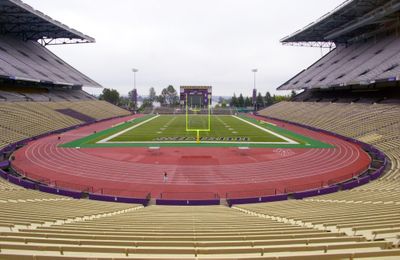Huskies’ reach for taxes hits Cougar nerve
Fans fight $150 million for UW stadium fix

OLYMPIA – Mike Bernard doesn’t mince words when asked what he thinks of the University of Washington’s request for $150 million in tax money to remodel Husky Stadium.
“It’s really just a brazen money grab,” he said recently. “There’s really no reason they need public money to rebuild their stadium.”
The Bellevue tax adviser – a proud alumnus of UW archrival Washington State University – has launched a campaign with a handful of other WSU Cougar fans to try to stop tax dollars from helping pay for the $300 million stadium overhaul. Through an e-mail campaign and fan sites, they’re trying to answer the Huskies’ request with a chorus of Cougar “Nos.”
Proponents of the project argue that it’s a critical safety project on a stadium that hasn’t seen a substantial renovation in decades.
“I just think this is pretty pathetic,” state Sen. Margarita Prentice, D-Renton, said of the efforts of Bernard and his Cougar allies. “The president of WSU should contact this guy and put a stop to it.”
Prentice was prime sponsor of February’s Senate Bill 6848, which would have steered millions of tax dollars into the project. She says it’s purely a safety issue. Built in 1920, the facilities are aging and the stairs literally crumbling.
“It’s a horrendous state of affairs,” Prentice said of the stadium’s condition, “and it’s not something that we can just let go. No responsible person would say ‘Let it be.’ ”
After a late start, the bill died in committee. But Prentice and other state officials say UW’s proposal remains alive.
“I had folks from the athletic department visiting me yesterday,” Gov. Chris Gregoire’s legislative director, Marty Brown, said last week. Proponents are quick to point out that UW’s plan requires no new taxes. It would merely continue a series of King County-only taxes being used to pay off construction bonds for Qwest Field, Safeco Field and the old Kingdome. But once those debts are paid, the money would be “repurposed” to pay for the Husky Stadium project.
The cash comes from a complex web of local taxes, including hotels, motels, campgrounds, rental cars and restaurant and bar sales. Spokane County levies a similar car-rental tax, with the money limited to local public sports facilities or youth or amateur sports activities.
This steady stream of millions of dollars also helps pay for King County arts and cultural programs, youth sports and tourism promotion.
Since the stadium bonds are all on track to be paid off a little early, a lot of folks have their eyes on the dollars. Lawmakers have floated the idea of using some of the money for Seattle’s International District, among other things. The same day the UW representatives visited Brown, he also hosted a group wanting to tap into the money for affordable housing.
As UW has structured its proposal, the $150 million in taxes would pay for preservation work, such as replacing the lower seating area, adding earthquake reinforcement and new elevators and updating old utility lines, restrooms and concession areas.
The university says it would come up with the other $150 million in upgrades, including lowering the field, installing a new sound system and adding a club room and new premium seating areas.
Proponents, including former Gov. Dan Evans, pointed out to lawmakers earlier this year that the public/private split was more even than the funding for Safeco and Qwest fields, both of which were about three-quarters paid for with public money.
But Bernard, who calls Evans his “personal political hero,” says the arguments neglect a key fact: that UW can easily come up with the money on its own. Teams bring in a lot of money, he points out.
“Those taxes were put in place to do a specific thing, and once it’s done, they should go away,” he said. And if the taxes do remain, he said, “there’s better things to do with the money.”
The UW proposal is particularly irksome, he said, in light of Washington State University’s work to raise millions of dollars on its own to renovate Martin Stadium. His first choice would be that lawmakers reject UW’s request, he said. But if not, Bernard argues, public financing should also go to WSU’s project.
If roused, Cougar fans could be a formidable lobbying force, particularly in key Puget Sound legislative districts. Of the 146,000 alumni worldwide for whom WSU has current addresses, 60 percent live in Western Washington.
Shortly before going home this spring, Washington lawmakers set up a task force to wade into the overlapping web of local taxes, recipients and new proposals. The Joint Task Force on Local Financing Options for King County plans to hold meetings this fall. Bernard is hoping to turn out Cougars to argue against UW’s plan, both at hearings and in e-mails and calls to lawmakers.
To Prentice, who chairs the Senate’s powerful budget committee, the opposition sounds a lot like an “adolescent football rivalry.”
“We do things for all of our schools,” she said. “Once we start getting into this kind of a juvenile approach, it’s going to hurt everyone.”